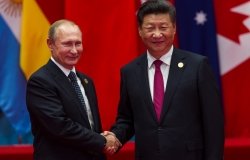Revisiting Kim Dae Jung
Chaibong Hahm, Senior Political Scientist, RAND Corporation; Kirk Larsen, Associate Professor of History, Brigham Young University; Sung-Yoon Lee, Adjunct Assistant Professor of International PoliticsThe Fletcher School, Tufts University
Overview
Making his name as a staunch advocate for democracy and as a politician who consistently challenged the ruling powers in Seoul during the 1960s and 1970s, Kim Dae-jung survived a military coup, an assassination attempt, time in prison and a period of house arrest to become president of South Korea in February 1998. Even before his death in August this year, commentators compared Kim to Nelson Mandela, and spoke of him as a hero of democracy. What is Kim's legacy in South Korean domestic politics today? How did Kim manage Seoul's relationships with its other international partners and what is his legacy for Korean diplomacy today? How are his approaches to North Korea to be assessed, given that Pyongyang has since engaged in more brinkmanship? These questions were considered at a December 2 event, sponsored by the Asia Program.
During his presentation, Chaibong Hahm, senior political scientist at RAND, placed Kim within the context of political theory as well as South Korea's broader history. Kim contrasted significantly with the political and military elites who previously dominated Korea. Moreover, by focusing on the concerns of labor, Kim also advocated an alternative to the developmental state, a form of capitalist organization that nevertheless allows for a large degree of government guidance of the private sector. He also came from the Jeolla region, an underdeveloped and politically neglected corner of the country.
Kim thus represented an antithesis to conventional forms of government epitomized by former president Park Chung-hee, and opened up tensions in Korean politics that were previously suppressed. Hahm believes that such tensions have not yet been resolved, and Korean politics is still jostling back and forth between the "Park-Kim polarity." He also expressed doubt as to whether South Korea's current leader, Lee Myung-bak, can rise above this tension and craft a new synthesis in his nation's politics.
Kirk W. Larsen, associate professor of Korean history at Brigham Young University, explained three events which characterized Kim's diplomacy beyond the Korean peninsula. The first was the Asian financial crisis, known as the IMF (International Monetary Fund) crisis within Asia. While in 1997 candidate Kim opposed the acceptance of conditional IMF loans to deal with the problem of Korea's over-leveraged financial sector, in 1998 President Kim accepted the need for them, and despite his close ties to the labor movement, acted quickly to restore international confidence in South Korea by liberalizing its economy.
The second significant event was Kim's meeting with Prime Minister Keizo Obuchi of Japan. Although ties between the two nations were later strained when President Roh Tae-woo pressed Japan on history issues, Kim elicited a long-awaited apology from Tokyo for Japanese brutality during its 1910-1945 colonization of Korea, and laid the basis for increased economic and military cooperation between the two nations.
Talks with United States President George W. Bush, the third significant event in Larsen's presentation, were not so successful. Kim generally had good relations with the United States, but could never elicit support from Bush for the Sunshine Policy, Kim's engagement with North Korea that would serve as the signature policy of his presidency.
Given his commitment to democracy, his handling of the IMF crisis, and his attempts to make peace on the Korean peninsula, Kim is often viewed in a positive light by observers outside of South Korea. However, the Sunshine Policy, and, in particular, Kim's role in crafting and implementing it, remains controversial within the republic itself. Many remember Kim as a "symbol" who came to embody the hopes of a people for reunification.
However, Sung-Yoon Lee, assistant professor of international politics at the Fletcher School, Tufts University, believes the majority of South Koreans will come to assess his presidency more soberly as historical records become available. While Kim had an opportunity to, in Hegel's formulation, "actualize his age" as a true national hero, he went against the true "will" of the South Korean people by propping up an immoral North Korean regime.
Lee offered a very negative assessment of Kim's interaction with North Korea, and painted the economic inducements that Seoul offered—with seemingly few conditions—to Pyongyang as characteristic of Kim's blind commitment to a policy that had become a "shibboleth" of his administration. While Lee acknowledged there is an argument that a stable North Korea is in the national interests of the South, he condemned what he saw as a stubborn urgency to engage the North, even to the point of blithely ignoring difficult questions about the human rights of its citizens.
By Bryce Wakefield
Robert M. Hathaway, Director, Asia Program
Hosted By

Indo-Pacific Program
The Indo-Pacific Program promotes policy debate and intellectual discussions on US interests in the Asia-Pacific as well as political, economic, security, and social issues relating to the world’s most populous and economically dynamic region. Read more

North Korea International Documentation Project
The North Korea International Documentation Project serves as an informational clearinghouse on North Korea for the scholarly and policymaking communities, disseminating documents on the DPRK from its former communist allies that provide valuable insight into the actions and nature of the North Korean state. It is part of the Wilson Center's History and Public Policy Program. Read more
Thank you for your interest in this event. Please send any feedback or questions to our Events staff.










